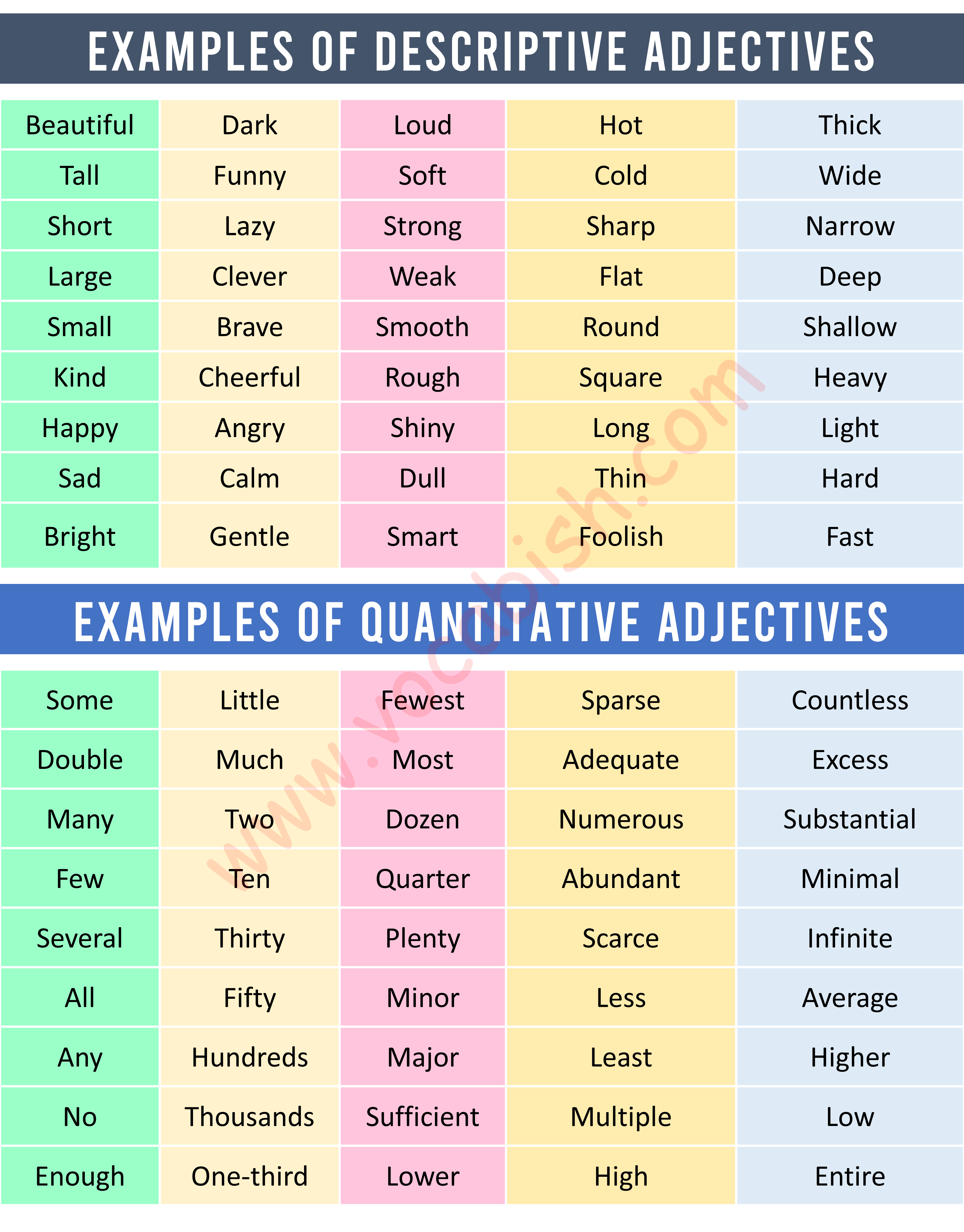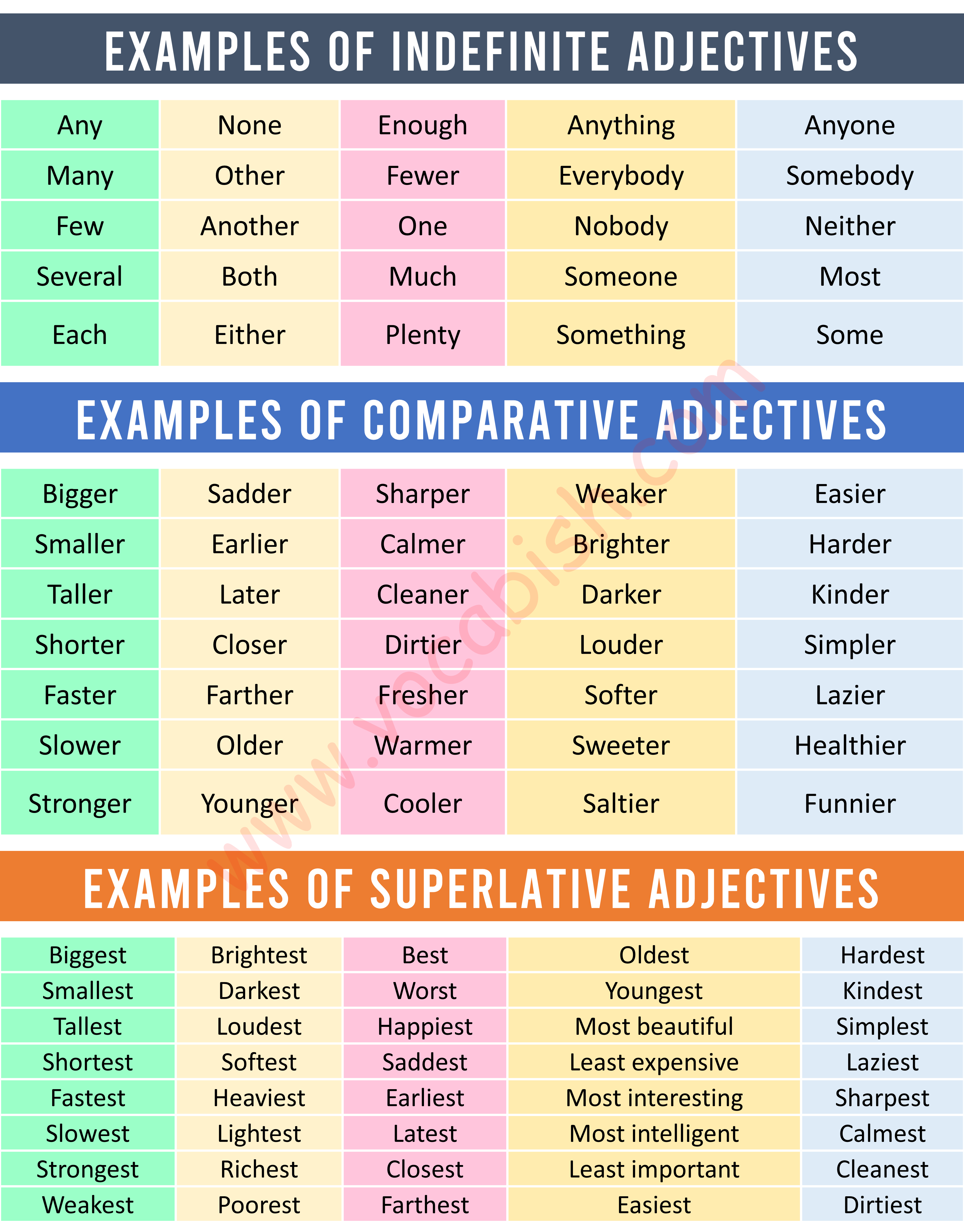Here’s the list of 300+ A to Z Adjectives list in English:
A to Z List of Adjectives in English
List of Descriptive Adjectives
These adjectives describe qualities of nouns.
- beautiful
- tall
- short
- large
- small
- kind
- happy
- sad
- bright
- dark
- funny
- lazy
- clever
- brave
- cheerful
- angry
- calm
- loud
- soft
- strong
- weak
- smooth
- rough
- shiny
- dull
- hot
- cold
- sharp
- flat
- round
- square
- long
- thin
- thick
- wide
- narrow
- deep
- shallow
- heavy
- light
- hard
- gentle
- smart
- foolish
- fast
- slow
- clean
- dirty
- fresh
- stale
List of Quantitative Adjectives
These adjectives indicate quantity or amount.
- some
- many
- few
- several
- all
- any
- no
- enough
- whole
- little
- much
- two
- ten
- thirty
- fifty
- hundreds
- thousands
- one-third
- half
- double
- fewest
- most
- dozen
- quarter
- plenty
- minor
- major
- sufficient
- sparse
- adequate
- numerous
- abundant
- scarce
- less
- least
- multiple
- countless
- excess
- substantial
- minimal
- infinite
- average
- higher
- lower
- minimal
- minimal
- high
- low
- entire

List of Demonstrative Adjectives
These point out specific nouns.
- this
- that
- these
- those
List of Possessive Adjectives
These indicate ownership or possession.
- my
- your
- his
- her
- its
- our
- their
List of Interrogative Adjectives
These are used to ask questions.
- which
- what
- whose
List of Indefinite Adjectives
These refer to non-specific nouns.
- any
- many
- few
- several
- each
- all
- some
- none
- other
- another
- both
- either
- neither
- most
- enough
- fewer
- one
- much
- plenty
- anyone
- somebody
- anything
- everybody
- nobody
- someone
- everybody
- anyone
- someone
- something
List of Comparative Adjectives
These compare two nouns.
- bigger
- smaller
- taller
- shorter
- faster
- slower
- stronger
- weaker
- brighter
- darker
- louder
- softer
- heavier
- lighter
- richer
- poorer
- better
- worse
- happier
- sadder
- earlier
- later
- closer
- farther
- older
- younger
- more beautiful
- less expensive
- more interesting
- more intelligent
- less important
- easier
- harder
- kinder
- simpler
- lazier
- sharper
- calmer
- cleaner
- dirtier
- fresher
- warmer
- cooler
- sweeter
- saltier
- healthier
- funnier
List of Superlative Adjectives
These describe the extreme or highest degree of something.
- biggest
- smallest
- tallest
- shortest
- fastest
- slowest
- strongest
- weakest
- brightest
- darkest
- loudest
- softest
- heaviest
- lightest
- richest
- poorest
- best
- worst
- happiest
- saddest
- earliest
- latest
- closest
- farthest
- oldest
- youngest
- most beautiful
- least expensive
- most interesting
- most intelligent
- least important
- easiest
- hardest
- kindest
- simplest
- laziest
- sharpest
- calmest
- cleanest
- dirtiest
- freshest
- warmest
- coolest
- sweetest
- saltiest
- healthiest
- funniest

Adjectives make your English sentences more colourful, clear, and interesting. They help describe people, places, and things in detail, making your communication more expressive.
FAQs about Adjectives List
What is an adjective in English grammar?
An adjective is a word that describes a noun or pronoun. It tells more about the quality, size, colour, or number of something.
Example: a beautiful flower, three apples, a tall man.
What are some common examples of adjectives?
Common adjectives include:
happy, tall, red, small, beautiful, big, cold, easy, old, fast.
These words help make sentences more interesting and detailed.
What are the types of adjectives in English?
There are several types of adjectives, such as:
- Descriptive Adjectives → beautiful, large
- Quantitative Adjectives → some, many
- Demonstrative Adjectives → this, that
- Possessive Adjectives → my, our
- Interrogative Adjectives → which, what
How do adjectives make sentences better?
Adjectives make sentences clearer and more expressive by giving extra details.
Example: Instead of saying “I saw a car”, you can say “I saw a red car”.
What is the difference between adjectives and adverbs?
An adjective describes a noun (She is beautiful), while an adverb describes a verb, adjective, or another adverb (She sings beautifully).
Read More

